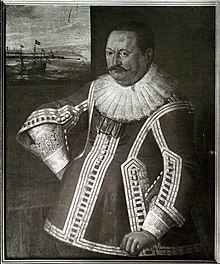Arend Dickmann
Arend Dickmann | |
|---|---|
 A portrait of Arend Dickmann. | |
| Born | 1572 Delft,Netherlands |
| Died | 28 November 1627 Gdańsk Bay |
| Allegiance | |
| Service | Polish–Lithuanian Commonwealth Navy |
| Years of service | 1626–1627 |
| Rank | Admiral |
| Unit | 1st Squadron |
| Battles / wars | Polish–Swedish War† |
Arend Dickmann,(1572 – 28 November 1627) also originally spelled asDijckman,was anAdmiralof thePolish–Lithuanian Commonwealth Navy,that commanded the fleet in theBattle of Oliwain 1627, during thePolish–Swedish War.[1]
History
[edit]Before the military service
[edit]Dickmann wasDutchborn inDelft,Netherlandsin 1572. Since 1608, he lived inGdańsk,Polish–Lithuanian Commonwealth,where he was the captain and owner of amerchant shipthat transportedcerealandoakwood.[1]
Military service
[edit]In 1626, he joined thePolish–Lithuanian Commonwealth Navyduring thePolish–Swedish War.On 24 November 1627, he was given the rank ofadmiral,becoming thecommander-in-chiefof the navy. He served aboard the fleetflagshipRitter Sankt Georg.On 28 November 1627, he commanded the fleet during theBattle of Oliwa,a major encounter during the war, that was fought in theGdańsk Bay.During the battle, his ship had attacked andboardedthe enemy galleonTigern.The fight aboard the ship ended with a Polish victory and the capture of the vessel. Dickmann also forced the crew of another, theSolen,to scuttle their vessel.Ritter Sankt Georghad also fired from thebroadside,hitting the enemy galleonPelikanen.Dickmann had died at the end of the battle, aboard theTigern,being hit with astrayround shot,that was probably shot from the enemy Pelikanen, or infriendly firefromFliegender Hirsch.Ritter Sankt Georgitself sustained the damages in the battle, including being hit 3 times under the line of water.[2][1][3]
The funeral
[edit]He was ceremonially buried on 2 December 1627 inGdańsk,inSt. Mary's Church.The funeral was financed by the kingSigismund III Vasa.Before his coffin marched 33 pairs of bound Swedishprisoners of war.The coffin was accompanied by amarineguard of honour,royal officials, and members of the City Council.[4]The coffin was laid to rest in the northern wall of thechancel,near the Saint John chapel.[5]
Citations
[edit]References
[edit]- ^abc"Arend Dickmann - zwycięzca bitwy pod Oliwą".wiatrak.nl.
- ^J. Pertek:Polacy na morzach i oceanach,vol. 1.
- ^Władysław Całka."Bitwa pod Oliwą (1627)".facta-nautica.graptolite.net(in Polish).
- ^"Gdzie spoczywa admirał Arend Dickmann?".trojmiasto.pl(in Polish).
- ^"Tajemnica pochówku Arenda Dickmanna odkryta".historia.trojmiasto.pl(in Polish).
Bibliography
[edit]- J. Pertek:Polacy na morzach i oceanach,vol. 1, Poznań: Wydaw. Poznańskie, 1981, ISBN 83-210-0141-6, OCLC 749548852.
